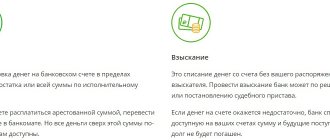Dear readers of our site.
Legal is pleased to welcome you to the pages of our website. Here, following our tradition, we talk about the intricacies of solving issues of getting out of debt.
What can we say... Over the two months of the blog’s existence, we have answered many questions. A lot of work has been done, which has yielded positive results.
We constantly receive letters of gratitude from our readers; our readers have become better versed in banking tricks, have become more careful and, accordingly, more literate. So, the point is that we reveal the secrets of our work - there is!
And today, we will touch on the topic of double write-off in enforcement proceedings.
Grounds for seizure of an account by bailiffs
A common reason for the seizure of a current account is outstanding debt to creditors. Upon a written application from the claimant and on the basis of a writ of execution, the bailiff issues a resolution to initiate enforcement proceedings.
The bailiff sends the order to both the claimant and the debtor. After the expiration of the five-day period for voluntary execution, the bailiff is obliged to take measures to forcibly collect the debt (clause 12 of Article 30 of Law No. 229-FZ). Next, the bailiff issues a foreclosure order and sends it to the servicing banks where the company has current accounts.
Important!
The servicing bank must immediately comply with the demands of the bailiff to collect funds and within three days report to the recoverer or bailiff on their execution (clause 5 of Article 70 of Law No. 229-FZ).
The amazing story of double debiting
You won’t believe it, but for more than 10 years of existence on the market, we have never encountered this problem.
It seems to us that citizens voluntarily and rarely comply with the requirements of the executive document. This is usually associated with large amounts of legal debt. Judge for yourself, a writ of execution arrives at the bailiff service in the amount of 50,000 rubles. A simple worker who works in an organization and receives 10 thousand rubles a month - where will he get the whole amount at once...
Accordingly, this fact justifies the situation that we have not had to deal with the problem of double write-off for many years.
Double debt write-off affected our company only in 2012. And the most interesting thing is that the debtor in this situation turned out to be the Bank, and not the citizen.
Read soon
One of our clients charged the Bank a fee for issuing a loan. According to the court decision, the client received a writ of execution in his hands and presented it to the bailiff service. The “machine” started working!
The bailiff, by law, obliged the Bank to voluntarily fulfill the requirements of the executive document within a 5-day period and transfer money to the account of the bailiff service.
The bank complied with these requirements voluntarily, but transferred the money not to the bailiffs’ account, but to the credit account of the Borrower (in this enforcement proceeding, the creditor) or simply to the current account of our client.
The Bank did not notify either the bailiff service or the Borrower, our client, about this. Naturally, the bailiffs, after the expiration of the 5-day period, seized the Bank’s correspondent account and wrote off the amount of debt from there under the writ of execution...
The client received the money from the bailiff service. It would seem that everything went well... The client’s case was archived.
Ay, no! Four months after the debit from the correspondent account, the Bank submitted an application for double debiting in enforcement proceedings. So I had to again take the client’s file out of the archives, go to court and defend interests.
During all the legal troubles, the bailiff service proved that it was right in the example under consideration. She proved that proper fulfillment of the requirements consists, among other things, in the correct transfer of funds exactly according to the details specified in the bailiff’s request.
The bank tried to challenge this decision in higher authorities, reached the cassation court and stopped there, realizing its mistake...
Here I remember a very good Russian proverb - “initiative can be punished!” So the Bank took the initiative and transferred the money to a location other than where it was instructed, for which it paid with a double write-off.
For example
Such as:
- writs of execution;
- court orders;
- certificates issued by labor dispute commissions;
- orders of the bailiff.
Funds in the account are subject to seizure in the amount specified in the executive document (for example, in judicial acts and orders, writs of execution).
If there are no funds or there are insufficient funds, the bank continues further execution of the arrest order as funds arrive in the debtor’s accounts until the said decision is executed in full or until the arrest is lifted by the bailiff (clause 6 of Article 81 of Law No. 229- Federal Law).

If there are insufficient funds in the account to satisfy all the requirements presented to it, funds are written off in the order given in clause 2 of Article 855 of the Civil Code of the Russian Federation.
What is double debiting?
Double write-off is a write-off two or more times according to the same requirement of an executive document. As we can see, in such a situation, as a rule, the interests of the debtor suffer.
In case of double write-off, the debtor, having paid and fulfilled the requirements of the writ of execution on a voluntary basis, is forced to pay the same amount again in the course of compulsory execution.
Does this really happen? - you ask. Oddly enough - yes, it happens! And practice knows quite a lot of similar cases.
This usually happens when the debtor voluntarily complied with the requirements of the writ of execution, and the bailiff, not having sufficient information about the payment made, forcibly writes off the same amount of debt a second time.
Double debt write-off can happen to anyone, and in the most seemingly harmless situation:
For example
Based on the order of the bailiff (as part of enforcement proceedings for compensation for damage to someone else’s property), the company’s funds were seized. The company's bank account received funds to pay employees' wages. Does the company have the right to first transfer funds from the current account to the current wages of employees?
Important!
The seizure of the debtor's current account does not violate the principle of priority for writing off funds (Letters of the Ministry of Finance of the Russian Federation dated 04.03.2013 No. 03-02-07/1/6344, dated 11.05.2012 No. 03-02-07/1-118).
This means that when a bailiff imposes an arrest within the framework of enforcement proceedings for the collection of payments, the write-off of which is carried out in the fifth priority, settlement documents for the transfer of payments related to the first, second, third and fourth priority are executed in priority order as they are received funds to the bank client's account.
That is, the bank will first transfer funds from the debtor’s current account to pay current wages to employees, and then according to the writ of execution.
If the bank violates the order in which funds are written off, the debtor has the right to recover losses from the bank (Resolution of the Federal Antimonopoly Service of the West Siberian District dated November 1, 2013 No. A03-20390/2012).

HOW MUCH DOES IT COST TO CLOSE AN LLC?
According to the publication “Bank or bailiffs: will be responsible for illegal write-offs under a writ of execution.”
Yakovlev Vladislav Anatolyevich Enforcement proceedings

In May, an interesting publication was published on the portal’s pages, which aroused interest. The essence of the publication was the possibility of recovering written-off funds, which by virtue of the law cannot be recovered in enforcement proceedings, such as benefits, social payments, etc. First of all, interest arose due to numerous requests from debtor citizens on this issue.
Having carefully read the Ruling of the Supreme Court of the Russian Federation dated March 13, 2018 N 6-КГ18-4, which was the basis for the publication, I believe that the highest court said “A” but did not say “B”.
So, the definition contains a hint that claims for the collection of funds before the changes were made could have been brought by the FSSP, in particular, “The responsibility for ascertaining the purpose of the debtor’s funds arriving in the bank account lay with the bailiff, which at the time of the commission of the disputed operations were provided for by the provisions of Part 9 of Article 69 of the above-mentioned Federal Law, paragraph 2 of Article 12, paragraph 1 of Article 14 of the Federal Law “On Bailiffs”, however Inozemtseva Yu.V. no claims were made against the bailiff service.”
However, if the FSSP had been brought in as a defendant in the case, I believe the claim would also have been denied due to the following.
To begin with, let’s go over the legislative innovations given in the ruling of the highest court:
Federal Law of 02.10.2007 N 229-FZ “On Enforcement Proceedings”, Part 9, Article 69: Information may be requested from tax authorities, banks and other credit organizations: 1) on the name and location of banks and other credit organizations in which accounts are opened debtor; 2) about the numbers of current accounts, the quantity and movement of funds in rubles and foreign currency; 3) about other valuables of the debtor stored in banks and other credit institutions.
Federal Law of July 21, 1997 N 118-FZ “On Bailiffs”: Clause 2 of Article 12 - The bailiff has the right: blah blah blah. Clause 1 of Article 14 - The legal requirements of the bailiff are subject to fulfillment by all bodies, organizations, officials and citizens on the territory of the Russian Federation.
And where does it say in the above provisions of the law about the duty of the bailiff to find out the purpose of the funds received in the bank account? The wording “may” and “has the right” does not give rise to obligations.
At the same time, introduced on 03/08/2015. amendments to the Federal Law of 02.10.2007 N 229-FZ “On Enforcement Proceedings”, the legislator reminded us that “the rescue of drowning people is the work of the drowning people themselves,” i.e. from this moment, citizens must independently provide documents confirming that the debtor has property belonging to him, income that cannot be levied under executive documents, including funds in accounts, deposits or deposits in banks and other credit organizations, as well as property that is the subject of pledge (Part 14.1, Article 30 of the Law).
Thus, unfortunately, bailiffs, when seizing accounts within the framework of enforcement proceedings for the collection of funds and property for debts, are not required to establish the sources of income and the purpose of funds lying in the bank accounts of the debtor, and therefore do not bear any responsibility for committing such actions .
Removing seizure from a current account
Removal of seizure from a current account is carried out on the following grounds:
- write-off in favor of the claimant of the amount of funds given in the writ of execution;
- receiving from the claimant an application to terminate the collection;
- obtaining from the bailiff a resolution to lift the arrest and to complete enforcement proceedings.
At the stage of enforcement proceedings, the debtor can peacefully settle the debt to creditors by signing a settlement agreement.

In practice, there are situations when, as a result of inaction committed by the bailiff, the bank in which the current account of the debtor company is opened does not receive copies of the decisions to lift the arrest and to complete the enforcement proceedings. This inaction violates the requirements of Law No. 229-FZ and the rights of the debtor, who is unable to carry out settlement transactions on this account, and gives the debtor the right to appeal the inaction of the bailiffs in court (Resolution of the Administrative District of the North Caucasus District dated August 19, 2015 No. A32- 5628/2015).
JUDICIAL DEBT COLLECTION





